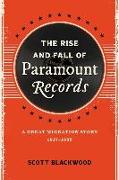- Start
- The Rise and Fall of Paramount Records
The Rise and Fall of Paramount Records
Angebote / Angebote:
Founded in 1917, Paramount Records was but one of the home-grown record labels of the New York Recording Laboratories (NYRL), a subsidiary of a chair company in Wisconsin with operations near Lake Michigan. No outsized hopes were pinned to Paramount or its sister companies, its founders knew nothing of the music business, the records themselves were only to drive sales of expensive phonograph cabinets they had recently begun manufacturing. Lacking both the resources and the interest to compete for top talent, Paramount's earliest recordings were gained little foothold with the listening public. By 1922, on the threshold of bankruptcy, Paramount embarked on a new business plan that had recently proven successful for other record companies: selling the music of Black artists to Black audiences. Advertising in newspapers dedicated to Black readership and utilizing other strategies such as local talent scouts and sales agents in the South, unconventional distribution channels, an 'open door' recording policy, direct mail order and the eventual hiring of the first Black record executive in a white-owned record company, Paramount expanded its footprint and eventually garnered many of the biggest selling titles in the 'race records' era. By the time it ceased operations in 1932, NYRL had pressed and shipped hundreds of thousands of records, including more than 2, 300 recordings of blues, gospel and jazz in its Paramount 'race' series alone, with a slate of performers including the likes of Louis Armstrong, Charley Patton, Ethel Waters, Son House, Fletcher Henderson, Skip James, Alberta Hunter, Blind Blake, King Oliver, Blind Lemon Jefferson, Ma Rainey, Johnny Dodds, Papa Charlie Jackson, and Jelly Roll Morton. In short, Paramount accidentally accomplished what others could not. On the one hand, Scott Blackwood's The Rise and Fall of Paramount is the story of happenstance. But it is also a tale about the sheer force of the Great Migration and the legacy of the music put down into the shellacked grooves of a 78 record: Black America finding its voice. It is the story the legacy of the Great Migration and how blues, jazz, and folk music transcended boundaries, and how this almost never happened. Blackwood brings to life these many moments-through creative nonfiction-and makes present and full-blooded what hadn't been brought to life before"--
Folgt in ca. 15 Arbeitstagen
